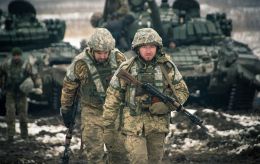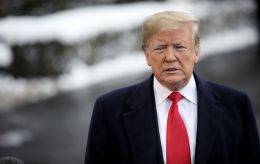Armor coalition for Ukraine launched in Warsaw, Russian troops hit Kharkiv - Wednesday brief
 RBC-Ukraine collage
RBC-Ukraine collage
On March 27, Russian troops attacked a residential area in Kharkiv with a UMPB D-30 guided munition. Meanwhile, a coalition of armored vehicles in support of Ukraine was launched in Warsaw.
RBC-Ukraine collected the main news for March 27.
Russian troops hit Kharkiv
Yesterday afternoon, March 27, explosions rocked Kharkiv. Almost immediately, the head of the Kharkiv Regional Military Administration Oleh Syniehubov and city mayor Ihor Terekhov reported an attack on the residential area.
As the head of the RMA said, there was partial destruction of two five-story buildings, a medical institution, an administrative building, and a common-use area. In total, 14 high-rise buildings and an educational institution were damaged as a result of the shelling.
A 59-year-old civilian man died, and 13 people were hospitalized. Among them are four children, the youngest is only 3 months old.
According to Syniehubov, the terrorists attacked the city with the D-30 UMPB guided munition, which can be launched both from an aircraft and Smerch MLRS.
Poland launches armored vehicle coalition for Ukraine
On March 26, the opening of a coalition of armored vehicles in support of Ukraine took place in Warsaw.
According to Ukraine's Ministry of Defense, during the meeting, representatives of the participating countries formulated a position on strengthening the Armed Forces of Ukraine with certain armored vehicle models and organizing their repair.
In addition to Poland and Germany, the initiative also involves the United Kingdom, Sweden, and Italy.
"The purpose of the armored vehicle coalition is to strengthen the armored shield of the Armed Forces of Ukraine, jointly enhance our military capabilities in countering the Russian aggressor, ensure the effective functioning, technical maintenance, and repair of equipment and weaponry provided to us by allies," said Deputy Minister of Defense of Ukraine Ivan Havryliuk, who led the Ukrainian delegation.
Within the framework of the coalition, four syndicates have already been created. Each has been assigned specific tasks:
- supply of weapons and ammunition for Western armored vehicles;
- technical maintenance and repair;
- training of crews and technical personnel;
- development of effective tactics for the use of armored vehicles on the battlefield.
"This is a very important initiative of our allies considering the existing issues in the Armed Forces of Ukraine with the repair of foreign-made armored vehicles. I hope that with the help of allies, we will be able to quickly, as much as possible, establish an effective repair base for Western armored vehicles in Ukraine," Havryliuk added.
He clarified that within the coalition, a roadmap will be developed in line with the strategy for the development of the Armed Forces of Ukraine. It is expected that in the long term, coalition members will assist Ukraine in creating a fleet of vehicles and establishing industrial partnerships.
Germany to transfer 10,000 shells to Ukraine in coming days
Germany will be able to transfer 10,000 artillery ammunition to Ukraine in the coming days, which was previously announced as part of the military aid package, states the head of the Situational Center for Ukraine at the German Ministry of Defense, Christian Freuding.
According to him, in Berlin, it has been decided to supply ammunition to Ukraine in three stages.
"At the first stage - in the coming days - Germany will transfer 10,000 shells to Kyiv," he says.
Next, Germany will participate in a Czech initiative to purchase ammunition for the Ukrainian Armed Forces.
Germany has concluded a bilateral agreement for the long-term perspective to supply Ukraine with an additional 100,000 shells - starting from approximately the fourth quarter of 2024.
EU ambassadors approve extension of trade liberalization with Ukraine
European Union ambassadors have supported the extension of the tariff waiver on agricultural imports from Ukraine.
"EU ambassadors have reached a new compromise on expanding trade measures for Ukraine, providing a balanced approach between supporting Ukraine and protecting EU agricultural markets," reports the presidency of Belgium in the EU Council
It is clarified that the initiative will now be presented to the European Parliament "in view of a swift agreement."
As Radio Liberty reports, citing an unnamed official, EU ambassadors approved the extension of trade liberalization with Ukraine on the condition that quotas and tariffs under the safeguard mechanism would be introduced taking into account import volumes not only in 2022 and 2023 but also in 2021.

